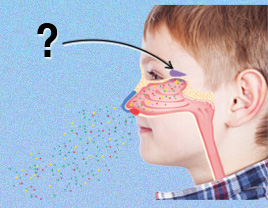3: How do smells enter your nose?
a) Through your nostrils
b) Through your olfactory bulb
c) Through your septum

5: What is the part of your nose called that traps
![]() smell molecules?
smell molecules?
a) The molecule trapper
b) The olfactory epithelium
c) The Smellometer
7: What is the name of this part of your nose?

a) The nasal passage
b) The olfactory epithelium
c) The olfactory bulb
9: How does your olfactory bulb pass smell
![]() messages to your brain?
messages to your brain?
a) Along a pathway of nerve cells
b) In your blood
c) Along a pathway of muscles
2: What are smells made of?
a) Tiny floating molecules
b) Tiny receptors
c) Invisible vibrations
4: Which of these statements is false?
a) Smells move from your nasal passages into
![]() your nasal cavity.
your nasal cavity.
b) When you breathe in air, smell molecules are
![]() sucked into your nose.
sucked into your nose.
c) Your nasal cavity is made of bone.
6: How many receptors are there inside your nose
![]() capturing smells?
capturing smells?
a) 10 million
b) 10 billion
c) 10,000
8: What does a receptor do once it captures a
![]() smell molecule?
smell molecule?
a) It sends a message to your stomach.
b) It sends a message to your olfactory bulb.
c) It sends a message to your brain.
10: Which body parts work together to help you smell?
a) Your nose, eyes, and brain
b) Your nose, nerve cells, and brain
c) Your nose, brain, and stomach









How much do you know about your sense of smell?
Test your knowledge by taking this quiz. All you need to do
is click on an answer for each question. Have fun!
Click to download a pdf
version of these questions.
11: How many smells can your brain recognize?
a) About 10 million
b) About 1,000
c) About 10,000
13: Which of these statements is true?
a) Your tastebuds and nose work as a team to help
![]() you taste your food.
you taste your food.
b) If you hold your nose, you can taste your food better.
c) Smell molecules cannot travel from your mouth
![]() into your nose.
into your nose.
14: How much mucus (or snot) does your nose
![]() produce every day?
produce every day?
a) About 1 cup
b) About 4 pints (2 liters)
c) About 2 pints (1 liter)




Click here to take
the quiz again.
© Ruby Tuesday Books Ltd 2014
12: Which of these statements is false?
a) Recognizing smells can help keep you safe.
b) Your brain can only recognize pleasant smells.
c) Your sense of smell helps protect you from eating
![]() food that has gone bad.
food that has gone bad.
15: What is the job of the mucus in your nose?
a) To make it easier to sniff.
b) To trap dirt and germs.
c) To gross out your friends.



